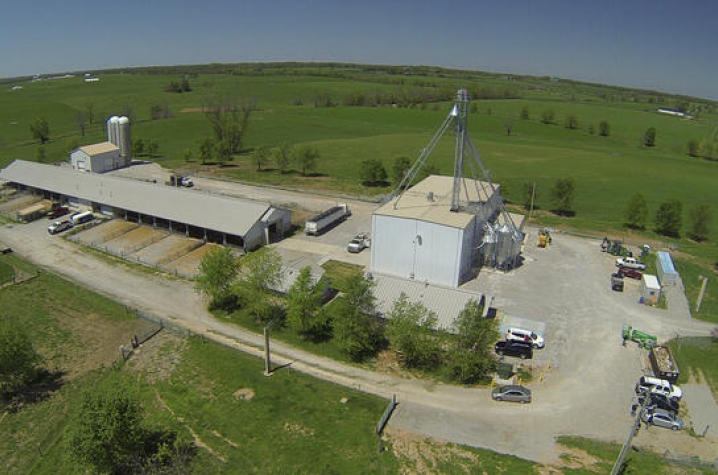State-of-the-Art Feed Mill Dedicated at UK Farm

LEXINGTON, Ky. (June 1, 2015) — In the early morning hours of May 26, 2013, a fire destroyed the feed mill at the University of Kentucky College of Agriculture, Food and Environment’s C. Oran Little Research Center in Woodford County. The college’s farms are home to thousands of animals including sheep, swine, poultry and cattle, and the fire threw a big hitch in the way the UKAg staff feed those animals. But the college chose to see the fire as an opportunity to create a state-of-the-art facility that would better serve the animals and propel research programs associated with animal feeding.
The new mill is designed to produce high-quality feed in a user-friendly environment. Feeding thousands of animals every day is a monumental task, and the mixing capacity of the new mill is poised to take on the task with expanded mixing capacity with four stainless steel mixers — a two-ton mixer, one-ton mixer, 1,000-pound mixer and a 500-pound mixer.
"This state-of-the-art feed center greatly enhances our feed mixing capabilities and will improve our nutritional research efforts through more precise blending of diets to targeted nutrient levels," said Richard Coffey, chair of the UK Department of Animal and Food Sciences. "Additionally, the computer-controlled automation and expanded ability to handle prepared diets in bulk makes this feed center much more user-friendly than our previous feed mills for those responsible for preparing diets."
The new mill has the same footprint as the old mill, but the storage silos were placed in a different location. The mill allows the staff to accurately mix simple and more complex diets and is automated in many ways, which is a very important feature for impactful research.
"Our research on nutritional management must be as accurate as it can be, because the information is used to recommend feeding systems for producers in Kentucky and beyond," said Nancy Cox, dean of the college and director of the Kentucky Experiment Station. "With this new feed mill, we are confident our recommendations can serve our industries as well as individual owners."
Anthony Pescatore, UKAg extension professor for poultry, said the fire allowed the research team to redefine the capacity needs of the farm and forced upgrades that will become essential to a top-notch research college. The stainless steel mixers help reduce cross-contamination between batches. It also furthers the college’s mission to be as sustainable as possible.
"Having milling capability allows us to produce our own feed and to use the grains and corn we produce on our farms," Pescatore said. "It also helps us keep our feed costs under control."
Precision is another important feature of the new mill. With different-sized mixers, users will be able to mix diets from 200 pounds all the way up to 2 tons with high accuracy. That’s important because all animals, even within species, don’t have the exact same nutrition requirements.
"We have been able to design a facility from the ground up that should serve our programs well into the future," said Robert Harmon, who was chair of the Department of Animal and Food Sciences at the time of the fire.
The new mill has dust-collection equipment and a vacuum system to aid in the cleaning process. A 1-ton hoist will lift ingredients into the mixers instead of workers having to carry them. The walkways and stairs are designed to prevent slips and falls, and it is temperature-controlled to make the facility more comfortable for workers. Another important feature of the new mill — the electrical system is explosion-proof.
"This is by far, a step up for our feed mill," Pescatore said. "A big focus of the Department of Animal and Food Sciences has always been animal nutrition, and we want to continue to build on our history of nutritional research. Precision nutrition is an important part of the future of animal agriculture. We’ll continue to focus on fine tuning the nutrient needs of animals and increase their efficient use of grains and feed."
MEDIA CONTACT: Aimee Nielson, 859-257-7707; aimee.nielson@uky.edu.




